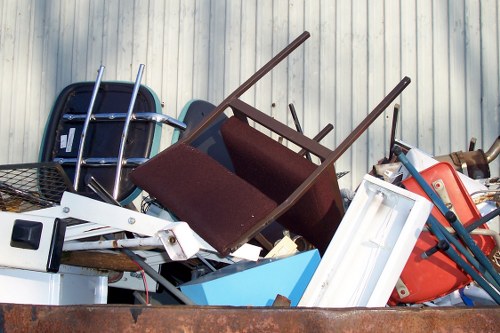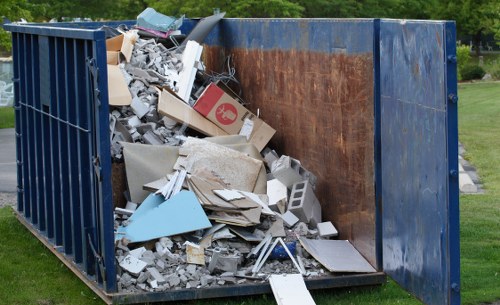Comprehensive Waste Recycling Services in Addiscombe

In today's world, effective waste management is crucial for maintaining a healthy environment and sustainable community. Waste recycling services in Addiscombe play a pivotal role in achieving these goals by ensuring that waste is properly collected, processed, and repurposed.
Addiscombe, a vibrant suburb in South London, has seen significant growth in its population and infrastructure. With this growth comes the increased challenge of managing waste efficiently. Local businesses and households alike are recognizing the importance of recycling to reduce their environmental footprint.
Implementing robust recycling services not only helps in managing waste but also contributes to the local economy by creating jobs and promoting green initiatives. In Addiscombe, various waste recycling services are tailored to meet the unique needs of the community, providing comprehensive solutions for different types of waste.
Types of Waste Recycling Services Available

Understanding the different types of waste recycling services available in Addiscombe is essential for both residents and businesses. These services cover a wide range of waste materials, each requiring specific handling and processing methods.
Municipal waste recycling involves the collection and processing of everyday household items such as paper, plastics, glass, and metals. This service is typically provided by local council authorities and is designed to make recycling convenient for all residents.
Commercial waste recycling, on the other hand, caters to businesses and organizations. This includes the recycling of office waste, industrial by-products, and other commercial materials. Specialized services ensure that commercial waste is managed efficiently, reducing the environmental impact of businesses in Addiscombe.
Residential Waste Recycling

Residential waste recycling services in Addiscombe are geared towards households, providing easy access to recycling bins and regular collection schedules. These services encourage residents to segregate their waste, ensuring that recyclable materials are not mixed with general waste.
Educational programs and community initiatives support residential recycling efforts by raising awareness about the benefits of recycling and how to properly sort waste. By participating in these programs, residents can contribute to a cleaner and more sustainable environment.
Additionally, some services offer bulky waste collection, allowing residents to dispose of large items such as furniture and appliances responsibly. This prevents such items from ending up in landfills, promoting a circular economy where materials are reused and recycled.
Commercial and Industrial Recycling

For businesses and industries, specialized recycling services are essential to manage waste effectively. These services often include the collection of office waste, electronic waste (e-waste), and industrial by-products.
E-waste recycling is particularly important given the rapid pace of technological advancements. Proper disposal and recycling of electronic devices prevent hazardous materials from harming the environment and allow valuable components to be reused.
Industrial recycling services focus on larger-scale waste production, ensuring that materials such as metals, plastics, and paper are processed appropriately. By partnering with recycling providers, businesses in Addiscombe can minimize their environmental impact and promote sustainability within their operations.
The Benefits of Recycling Services in Addiscombe

Implementing effective waste recycling services brings numerous benefits to the Addiscombe community. These advantages span environmental, economic, and social aspects, contributing to the overall well-being of the area.
- Environmental Protection: Recycling reduces the amount of waste sent to landfills, minimizing land degradation and pollution.
- Resource Conservation: Recycling conserves natural resources by reusing materials, reducing the need for raw material extraction.
- Energy Savings: Producing goods from recycled materials typically requires less energy compared to manufacturing from virgin resources.
- Economic Growth: The recycling industry creates jobs and stimulates economic activity within the community.
- Community Health: Proper waste management reduces the risk of health hazards associated with improper disposal.
Promoting Sustainability

Sustainability is at the heart of waste recycling services in Addiscombe. By promoting the reuse and recycling of materials, these services help to create a more sustainable future for the community.
Recycling initiatives encourage individuals and businesses to adopt environmentally friendly practices, fostering a culture of responsibility and stewardship towards natural resources.
Moreover, sustainable waste management practices contribute to the reduction of greenhouse gas emissions, combating climate change and its adverse effects on the environment.
Cost-Effectiveness

Recycling services can also be cost-effective for both individuals and businesses. By reducing the volume of waste, recycling can lower disposal costs and extend the lifespan of existing waste management infrastructure.
Businesses benefit from recycling by potentially reducing the costs associated with raw material procurement, as recycled materials can be a more economical alternative.
Additionally, some recycling programs offer financial incentives for participating, further enhancing the cost-benefit ratio of waste recycling services in Addiscombe.
How to Choose the Right Waste Recycling Service in Addiscombe

Selecting the appropriate waste recycling service is crucial to ensure that waste is managed effectively and sustainably. Here are key factors to consider when choosing a recycling provider in Addiscombe:
- Service Range: Ensure the provider offers the types of recycling services you require, whether residential, commercial, or industrial.
- Reputation: Look for providers with a solid reputation for reliability and effectiveness in waste management.
- Compliance: Verify that the service complies with local regulations and environmental standards.
- Pricing: Compare pricing structures to find a service that fits within your budget while offering quality services.
- Customer Support: Choose a provider that offers excellent customer support and is responsive to your needs.
Assessing Service Quality

Quality of service is a critical factor when selecting a waste recycling provider. High-quality services ensure that waste is properly sorted, processed, and recycled, maximizing the benefits of recycling efforts.
Consider the technology and processes used by the recycling service. Advanced recycling technologies can improve efficiency and effectiveness, leading to better outcomes for the environment.
Additionally, a service that provides regular and timely collections will help maintain consistent recycling practices, preventing the buildup of waste and ensuring that recyclable materials are processed promptly.
Environmental Impact

Evaluate the environmental impact of the recycling service. A provider committed to sustainability will implement practices that minimize environmental harm and promote the efficient use of resources.
Look for certifications or accolades that demonstrate the provider's commitment to environmental stewardship. Such recognitions can indicate a higher level of trust and responsibility in their operations.
Moreover, understanding how the provider handles different types of waste can give you insight into their overall environmental impact and effectiveness in recycling efforts.
Innovations in Waste Recycling

The waste recycling industry is continually evolving, with new technologies and methods enhancing the efficiency and effectiveness of recycling services. In Addiscombe, several innovative approaches are being adopted to improve waste management.
One such innovation is the use of automated sorting systems, which utilize advanced machinery and AI to accurately sort recyclable materials. This technology increases the speed and accuracy of waste sorting, reducing contamination and improving the quality of recycled materials.
Another advancement is the development of circular economy models, where waste materials are reintegrated into the production cycle, creating a closed-loop system. This model minimizes waste generation and maximizes resource utilization.
Community Engagement and Education

Community engagement and education are vital for the success of waste recycling services. In Addiscombe, various initiatives aim to educate residents and businesses about the importance of recycling and how to participate effectively.
Workshops, seminars, and public campaigns are organized to raise awareness about the benefits of recycling and provide practical guidance on waste segregation and disposal.
By involving the community in recycling efforts, these initiatives foster a collective responsibility towards environmental sustainability and encourage widespread participation.
Technology Integration

Integrating technology into waste recycling services enhances efficiency and accessibility. Mobile apps and online platforms allow residents to schedule pickups, track recycling efforts, and access information about recycling locations and guidelines.
Furthermore, data analytics can help recycling providers optimize their operations by analyzing collection patterns, predicting waste generation trends, and improving resource allocation.
Technological advancements also facilitate better communication between recycling services and the community, ensuring that residents are informed and engaged in recycling initiatives.
Challenges and Solutions in Waste Recycling

Despite the benefits, waste recycling services in Addiscombe face several challenges that need to be addressed to enhance their effectiveness.
- Contamination: Contaminated recyclable materials can reduce the quality of recycled products and increase processing costs.
- Public Awareness: Lack of awareness and understanding about recycling practices can hinder participation rates.
- Infrastructure: Insufficient recycling infrastructure can limit the capacity to process and manage waste effectively.
- Economic Constraints: Financial limitations can restrict the ability to invest in advanced recycling technologies and expand services.
Addressing Contamination

To combat contamination in recycling streams, education and strict guidelines are essential. Providing clear instructions on how to sort and clean recyclable materials can significantly reduce contamination rates.
Implementing fines or penalties for improper disposal can also serve as a deterrent, encouraging residents to adhere to recycling protocols.
Additionally, investing in better sorting technologies can help identify and remove contaminated materials more effectively, maintaining the integrity of recycled products.
Enhancing Public Awareness

Raising public awareness about the importance of recycling and the correct methods of waste segregation is crucial for improving participation rates. Community outreach programs, educational campaigns, and partnerships with local organizations can help disseminate information effectively.
Engaging schools and educational institutions in recycling initiatives fosters a culture of sustainability from a young age, ensuring long-term community commitment to recycling practices.
Moreover, showcasing the positive impacts of recycling through success stories and measurable outcomes can motivate more residents and businesses to get involved.
The Future of Waste Recycling in Addiscombe

The future of waste recycling services in Addiscombe looks promising, with continuous advancements and increasing community support driving progress towards more sustainable waste management practices.
Emerging technologies such as biotechnological recycling and smart waste bins are set to revolutionize how waste is collected and processed, making recycling more efficient and user-friendly.
Furthermore, collaborative efforts between the government, private sector, and community organizations will play a significant role in overcoming existing challenges and scaling up recycling initiatives.
Policy and Regulation

Supportive policies and regulations are essential for fostering a robust recycling infrastructure. The local government in Addiscombe is working towards implementing stricter waste management regulations and providing incentives for recycling initiatives.
Policies that mandate recycling targets for businesses and households can drive higher participation rates and ensure consistent progress towards sustainability goals.
Additionally, grants and funding opportunities can support the development of advanced recycling facilities and the adoption of innovative technologies.
Community-Driven Initiatives

Community-driven initiatives such as recycling drives, upcycling workshops, and local recycling competitions can enhance engagement and foster a sense of ownership among residents.
These initiatives not only promote recycling but also encourage creativity and resourcefulness in finding new uses for recycled materials.
By empowering the community to take an active role in recycling efforts, these initiatives contribute to a more resilient and sustainable waste management system.
Conclusion

Waste recycling services in Addiscombe are indispensable for promoting environmental sustainability, conserving resources, and fostering economic growth. By understanding the different types of services available and the benefits they offer, residents and businesses can make informed decisions about their waste management practices.
Addressing challenges such as contamination, public awareness, and infrastructure requires collaborative efforts and ongoing commitment from all stakeholders. Embracing innovative technologies and community-driven initiatives will further enhance the effectiveness of recycling services, paving the way for a greener and more sustainable future.
Don’t wait any longer to make a positive impact on the environment. Contact us today to learn more about how our waste recycling services in Addiscombe can help you contribute to a sustainable community.